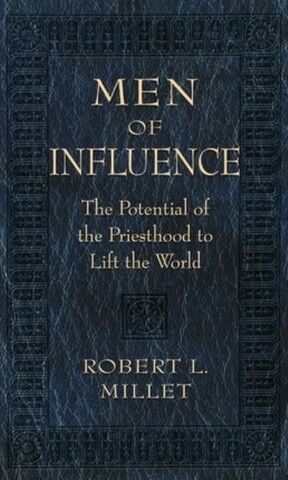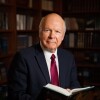There are certain roadblocks or barriers to communion with the Infinite, things that get in the way and prevent us from enjoying the kind of closeness with our Heavenly Father that we could have. We all could volunteer examples of such roadblocks. Let me suggest but a few.
1. Distraction and Preoccupation
Surely no roadblock is more prevalent than distraction and preoccupation. When it is time to pray, we must put aside the things of the world, even good things, in order to engage the greatest good. We do not rush into the divine presence, any more than we would rush into the office of the president of the Church or the president of the United States. It is often helpful, before we begin to pray, to slow down, stop what we're doing, sit quietly, listen to inspiring music, read several verses of scripture, and ponder and reflect on what we are about to do—literally approach the throne of God.
2. Serving Two Masters
Another roadblock to an effective prayer life is duplicity or trying to lead two disparate lives. Thus we would suppose that a person who is worldly throughout the day would have great difficulty praying effectively at night. Elder Howard W. Hunter observed: "Henry Ward Beecher once said: 'It is not well for a man to pray cream and live skim milk.' That was a century ago. There is now before us a danger that many may pray skim milk and live that not at all" (Ensign, November 1977, 52). Just as our lives are only as good as our prayers, so our prayers are only as good as our lives. That is, the more faithful we become in keeping the Lord's commandments and putting first things first, the more we open the doors of communication with the heavens and the more comfortable we feel with holy things and holy beings.
3. Thoughtlessness and Carelessness
One of our most common shortcomings is to say our prayers regularly but to do so without much thought, reflection, or devotion, except when we suppose that we really need God's help. Elder Hunter explained: "If prayer is only a spasmodic cry at the time of crisis, then it is utterly selfish, and we come to think of God as a repairman or a service agency to help us only in our emergencies. We should remember the Most High day and night—always—not only at times when all other assistance has failed and we desperately need help. If there is any element in human life on which we have a record of miraculous success and inestimable worth to the human soul, it is prayerful, reverential, devout communication with our Heavenly Father" (Ensign, November 1977, 52).
A practice that I have found particularly beneficial—especially when I find myself just reciting words instead of really communing with God—is to devote myself to a prayer in which I ask the Lord for absolutely nothing but instead only express sincere gratitude for my blessings. This kind of prayer pays remarkable dividends and settles the soul as few other efforts (Bednar, Ensign, November 2008, 42).
► You'll also like: 3 Prayers That Will Get You Out of a Prayer Rut & Draw You Closer to Heavenly Father
4. Fatigue
Coach Vince Lombardi wisely observed that fatigue makes cowards of us all. Fatigue also makes it extremely difficult to enjoy our prayers. Perhaps it is not always wise to make our prayers the last thing we do each day. It may be worthwhile to occasionally have prayer well before going to bed, while our minds and bodies are in a mode to do more than utter a few well-worn and familiar phrases. There have been several times over the years when one or two of the children have talked me into watching a late movie with them, perhaps on a Friday night. It seemed to me at the time as though I would inevitably either fall asleep on the floor or on the couch. More than once I have gone into my bedroom, closed the door, and had a meaningful prayer before going downstairs to watch the movie.
5. Insincerity and Overcomplicating
Two keys to meaningful prayer, even public prayer, are sincerity and simplicity. We have no one to impress, no one's judgment to fear. Our words are addressed to Him who knows all things, including the desires of our hearts (D&C 6:16). It is thus wise to speak the words that we really feel. In Shakespeare's play Hamlet, Claudius stopped praying because his heart was simply not in his prayers. He said: "My words fly up, my thoughts remain below; / Words without thoughts never to heaven go" (act 3, scene 3.) The Prophet Joseph Smith taught in regard to prayer: "Be plain and simple, and ask for what you want, just like you would go to a neighbor and say, 'I want to borrow your horse to go to the mill'" (in Andrus and Andrus, They Knew the Prophet, 100). As a part of his own prayer to God, Zenos exclaimed: "Yea, thou art merciful unto thy children when they cry unto thee, to be heard of thee and not of men, and thou wilt hear them" (Alma 33:8).
► You'll also like: How to Pray in a Way God Can Answer
6. Time
I hope as we are called upon to pray that we will slow down, take our time, and pray from our hearts. I am often pained as people hurry through a prayer as though it were a formality or something that needed to be dispensed with as quickly as possible. This is particularly true for the closure of the prayer. Sometimes people are so eager to be done with the prayer that they race through the name of Jesus Christ as though they were sprinting toward a finish line. This cannot be pleasing to our Lord's Father, who is also our Father. We should end our prayers with the dignity and transcendent respect deserved by the One who suffered for our sins and ransomed us with his blood, even the Savior of all humankind. If you and I will pray sincerely, from our hearts, speaking our words soberly and distinctly—especially the concluding words, "in the name of Jesus Christ"—we will begin to feel a power and a sacred influence in our lives that attests that the Lord hears us and is pleased with us.
7. Infrequency
One of the things most needed in our prayer lives is regularity. Some people find it helpful to pray in the same place. One man I know set aside a special place in his home, a place that over the years came to be like unto a personal sacred grove. When he entered that room he naturally felt a hallowed presence because over the years he had experienced there some of the most profound insights and some of the sweetest feelings and impressions of his life. That room had become for him, almost a holy of holies within his own home.
Almost fifty years ago a man taught me something that changed my life. He said simply: "When you get out of bed in the morning, never let your feet touch the floor first. Always let your knees touch first." I recommend that bit of practical wisdom to you, especially if you find it difficult to have a regular, meaningful morning prayer. I have been surprised at how many people who would never, ever consider going to bed without praying in the evening have not managed to develop a habit of saying morning prayers. Perhaps my practical side comes through here, but I have thought that there are very few harmful or hazardous things that could happen to me between the time I lay my head on the pillow at night and the time I get up the next morning. But there are many challenges and temptations and decisions I must face throughout the day, and I need all the help I can get. From my point of view, evening prayers are extremely important, but morning prayers are vital.
There are prayers, and then there are prayers. Sometimes our prayers are joyful expressions of gratitude. On other occasions we may need some heavy burden to be lifted. At other times, we long for the kind of spiritual contact and close association that demands our most strenuous and disciplined efforts.
Each of us can refine and purify our lives through a greater attention to the regularity, intensity, and overall quality of our prayers. We who have been called to labor must learn to pray without ceasing, to commune with the Infinite when we are thrilled as well as when we are devastated, to give utterance to our souls' deepest longings when we have been prospered as well as when we have been humbled to the dust. We who are agents must communicate consistently with our divine Principal in order to ensure that what we say and what we do is just exactly what he would have said and done (D&C 64:29).
► You'll also like: How Silence Made Saying My Prayers More Meaningful
For more helpful insights on maturing spiritually, check out Men of Influence: The Potential of the Priesthood to Lift the World by Robert L. Millet, available at Deseret Book stores and deseretbook.com.





